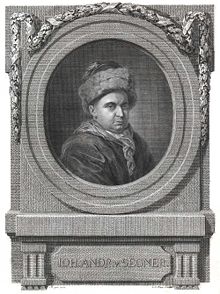Johann Andreas von Segner
| Johann Andreas Segner | |
|---|---|

Johann Andreas Segner's portrait
|
|
| Born | 9 October 1704 Pozsony, Kingdom of Hungary (now Bratislava, Slovakia) |
| Died |
5 October 1777 (aged 72) Halle, Duchy of Magdeburg, (now Halle, Germany) |
| Nationality | Hungarian |
| Citizenship | Kingdom of Hungary |
| Known for | Segner wheel |
| Scientific career | |
| Fields | mathematics |
| Institutions |
Jena Göttingen Halle |
| Doctoral advisor |
Georg Erhard Hamberger Simon Paul Hilscher |
| Doctoral students | Johann Georg Büsch |
Johann Segner (Hungarian: János András Segner, German: Johann Andreas von Segner, Slovak: Ján Andrej Segner, Latin: Iohannes Andreas de Segner; October 9, 1704 – October 5, 1777) was a Hungarian scientist. He was born in the Kingdom of Hungary, in the former Hungarian capital city of Pozsony (today Bratislava).
Johann Segner's ancestors came from Styria to Pressburg in the Kingdom of Hungary; by the 18th century. He studied at Pressburg, Győr and Debrecen. In 1725 Segner began studying at the University of Jena. In 1729 he received a medical certificate and returned to Pressburg, where he started to work as a physician, as well as in Debrecen. In 1732 he returned to Jena for his master's degree. In 1735 Segner became the first professor of mathematics, a position created for him, at the University of Göttingen. In 1755 he became a professor at Halle, where he established an observatory.
One of the best-known scientists of his age, Segner was a member of the academies of Berlin, London, and Saint Petersburg. According to Mathematics Genealogy Project, as of February 2013, he has over 66 thousand academic descendants, out of the total 170 thousand mathematicians in the database.
...
Wikipedia
